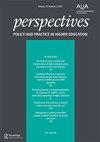Between ‘Körper’ and ‘Leib’ – Translating Michel Foucault’s concept of the body after Friedrich Nietzsche
Q2 Social Sciences
Perspectives: Policy and Practice in Higher Education
Pub Date : 2022-11-21
DOI:10.1080/0907676X.2022.2147846
引用次数: 0
Abstract
ABSTRACT This article analyses the German words ‘Leib’ and ‘Körper’ that can both be translated as ‘the body’ in English and as ‘le corps’ in French. The human body is a central object in the philosophies of Friedrich Nietzsche and Michel Foucault. Whilst ‘Körper’, originating in Latin, commonly refers to the body, ‘Leib’ stems from Middle High German meaning ‘the body’, ‘life’, and ‘person’. Nietzsche’s use of ‘Leib’ must be understood as an idiosyncrasy, an Untranslatable following Cassin. In Nietzsche’s thought, he insists on the aspects of life and the will to live, positing that the body ought not to be abstracted in philosophy. I show that the word ‘Leib’ is functional in Nietzsche’s philosophy on which, in turn, Foucault draws. Walter Seitter’s German translations of Foucault, especially of the essay ‘Nietzsche, la généalogie, l’histoire’ (1971) and the book Surveiller et punir. Naissance de la prison (1975), alternate between ‘Leib’ and ‘Körper’ to translate Foucault’s ‘le corps’. This raises the question which of the two words is most effective in translating ‘the body’ in Foucault. I argue that Foucault problematises Nietzsche’s ‘Leib’ because the body’s vital force and personal intimacy are at stake in a new political economy of the body.在“Körper”和“Leib”之间——解读弗里德里希·尼采之后的米歇尔·福柯身体观
摘要本文分析了德语单词“Leib”和“Körper”,这两个词在英语中可以翻译为“身体”,在法语中可以翻译成“军团”。在弗里德里希·尼采和米歇尔·福柯的哲学中,人体是一个中心对象。“Körper”源自拉丁语,通常指身体,“Leib”源自中古高地德语,意思是“身体”、“生命”和“人”。尼采对“莱布”的使用必须被理解为一种特质,是卡辛之后的一种不可转换的东西。在尼采的思想中,他坚持生活的各个方面和生活的意愿,认为身体不应该在哲学中抽象化。我证明了“莱布”这个词在尼采的哲学中是有作用的,而福柯又借鉴了这个词。Walter Seitter对福柯的德语翻译,尤其是论文《尼采,哲学,历史》(1971)和《监视者与双关语》一书。《监狱诞生》(1975),在“Leib”和“Körper”之间交替翻译福柯的《军团》。这就提出了一个问题,在福柯翻译“身体”时,这两个词中哪一个最有效。我认为福柯使尼采的“莱布”成为问题,因为身体的生命力和个人亲密关系在新的身体政治经济中岌岌可危。
本文章由计算机程序翻译,如有差异,请以英文原文为准。
求助全文
约1分钟内获得全文
求助全文
来源期刊

Perspectives: Policy and Practice in Higher Education
Social Sciences-Education
CiteScore
2.50
自引率
0.00%
发文量
24
 求助内容:
求助内容: 应助结果提醒方式:
应助结果提醒方式:


